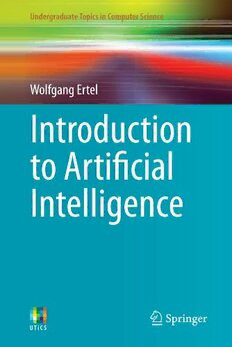Download Introduction to Artificial Intelligence PDF Free - Full Version
Download Introduction to Artificial Intelligence by Wolfgang Ertel (auth.) in PDF format completely FREE. No registration required, no payment needed. Get instant access to this valuable resource on PDFdrive.to!
About Introduction to Artificial Intelligence
The ultimate aim of artificial intelligence (A.I.) is to understand intelligence and to build intelligent software and robots that come close to the performance of humans. On their way towards this goal, A.I. researchers have developed a number of quite different subdisciplines.This concise and accessible Introduction to Artificial Intelligence supports a foundation or module course on A.I., covering a broad selection of the subdisciplines within this field. The textbook presents concrete algorithms and applications in the areas of agents, logic, search, reasoning under uncertainty, machine learning, neural networks and reinforcement learning.Topics and features:Presents an application-focused and hands-on approach to learning the subjectProvides study exercises of varying degrees of difficulty at the end of each chapter, with solutions given at the end of the bookSupports the text with highlighted examples, definitions, theorems, and illustrative cartoonsIncludes chapters on predicate logic, PROLOG, heuristic search, probabilistic reasoning, machine learning and data mining, neural networks and reinforcement learningContains an extensive bibliography for deeper reading on further topicsSupplies additional teaching resources, including lecture slides and training data for learning algorithms, at the website http://www.hs-weingarten.de/~ertel/aibookStudents of computer science and other technical natural sciences will find this easy-to-read textbook excellent for self-study, a high-school level of knowledge of mathematics being the only prerequisite to understanding the material. With its extensive tools and bibliography, it is an ideal, quick resource on A.I.Dr. Wolfgang Ertel is a professor at the Collaborative Center for Applied Research on Service Robotics at the Ravensburg-Weingarten University of Applied Sciences, Germany.
Detailed Information
| Author: | Wolfgang Ertel (auth.) |
|---|---|
| Publication Year: | 2011 |
| ISBN: | 9780857292988 |
| Pages: | 329 |
| Language: | English |
| File Size: | 5.605 |
| Format: | |
| Price: | FREE |
Safe & Secure Download - No registration required
Why Choose PDFdrive for Your Free Introduction to Artificial Intelligence Download?
- 100% Free: No hidden fees or subscriptions required for one book every day.
- No Registration: Immediate access is available without creating accounts for one book every day.
- Safe and Secure: Clean downloads without malware or viruses
- Multiple Formats: PDF, MOBI, Mpub,... optimized for all devices
- Educational Resource: Supporting knowledge sharing and learning
Frequently Asked Questions
Is it really free to download Introduction to Artificial Intelligence PDF?
Yes, on https://PDFdrive.to you can download Introduction to Artificial Intelligence by Wolfgang Ertel (auth.) completely free. We don't require any payment, subscription, or registration to access this PDF file. For 3 books every day.
How can I read Introduction to Artificial Intelligence on my mobile device?
After downloading Introduction to Artificial Intelligence PDF, you can open it with any PDF reader app on your phone or tablet. We recommend using Adobe Acrobat Reader, Apple Books, or Google Play Books for the best reading experience.
Is this the full version of Introduction to Artificial Intelligence?
Yes, this is the complete PDF version of Introduction to Artificial Intelligence by Wolfgang Ertel (auth.). You will be able to read the entire content as in the printed version without missing any pages.
Is it legal to download Introduction to Artificial Intelligence PDF for free?
https://PDFdrive.to provides links to free educational resources available online. We do not store any files on our servers. Please be aware of copyright laws in your country before downloading.
The materials shared are intended for research, educational, and personal use in accordance with fair use principles.

